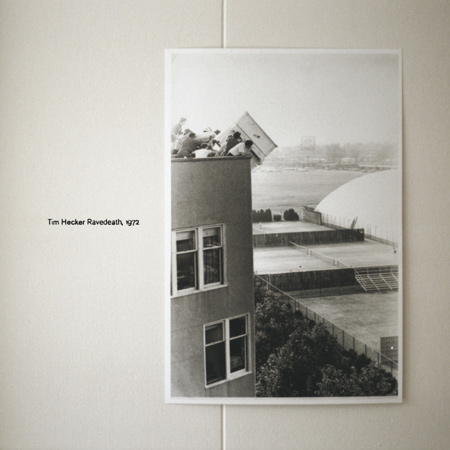A strange night at St Giles-In-The-Fields with Tim Hecker, which turned out to be something more like a real-time sound installation rather than a concert. This, I guess, is not a new problem with organ recitals: Hecker is sat in the organ loft, playing the church’s venerable instrument while the audience sit below, with their backs to him, in complete darkness, looking at the altar, and the silhouettes of two large speaker stacks.
To many who’ve enjoyed Hecker’s last album, “Ravedeath 1972” (and indeed fair chunks of his back catalogue), this must seem like a pretty appealing conceit. “Ravedeath 1972”, which he plays here more or less straight, is at once gaseous and magisterial, with a sepulchral gravity that its fundaments – as music played on a church organ, then manipulated through various computer patches and effects pedals – only emphasise. To sit silently in a church and absorb the totality of this music seems only logical.
It is, undeniably, impressive. Hecker’s reverberant music is often described as ambient, or at least quasi-ambient, but here it’s amped up to a serious volume. Sat as I am next to a pulpit once preached in by Wesley, however, the immensity of the noise turns out to be a little distracting rather than immersive. I start thinking about the nature of ambient music, about how volume and environment impact upon the music just as much as the music impacts upon its environment. And about how ambient music, when it’s turned up really high, also has the potential to sound rather industrial; that a casual flick of the knob, without altering the actual nature of the music, can so profoundly lessen my engagement with it.
Even though the mix is clear, it seems to me that loudness, at least in this case, somehow obscures the subtleties of some of Hecker’s music: that while, as with the obvious antecedent of My Bloody Valentine, the secret harmonies which emerge are beautiful of themselves, the essence of this music is at times obliterated by the forcefulness of the delivery. Perhaps it defeats the object of “Ravedeath”, but it would’ve been nice to get a sense of the air moving through the organ pipes, say, before all the billowing fx take over.
As it is, the biggest difference from the recorded version of the album is more frictional interference from the bank of effects pedals, adding a frisson of the spontaneous to something which otherwise could’ve been an unusually grandiose playback. But the feel of improvisation, the unexpected that you can find at a show by a comparable artist like Christian Fennesz, say, wasn’t so palpable.
As an event, it was quite something; as a concert, I think I left impressed, but maybe a little disappointed, too. Anyone else there?
Follow me on Twitter: www.twitter.com/JohnRMulvey


